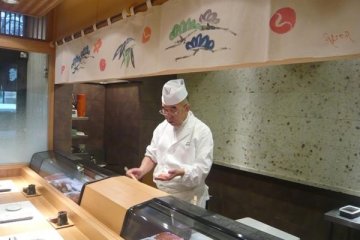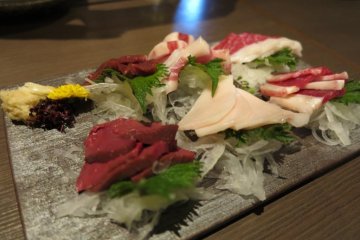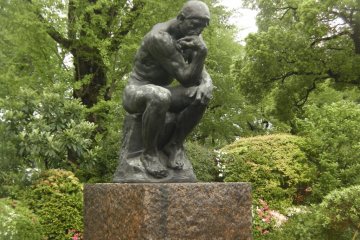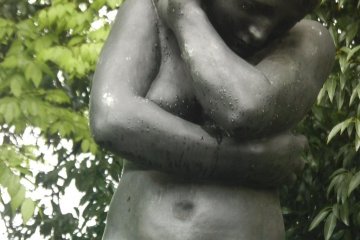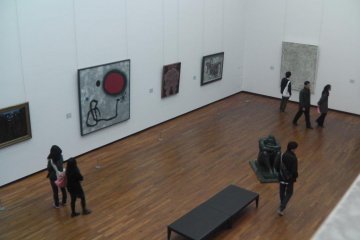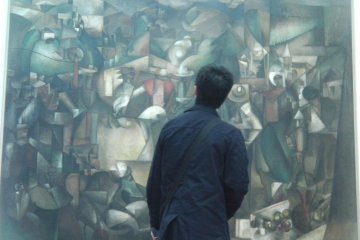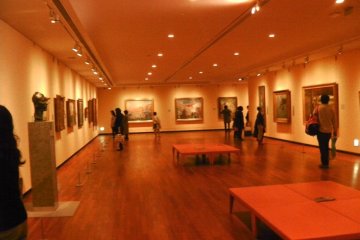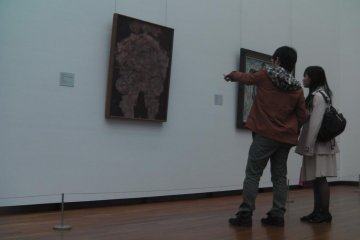For an afternoon of art and culture, head to the National Museum of Western Art. As the premier collection of art from the Western tradition in Japan, the NMWA hosts an impressive collection of work from world-renowned artists, and has the clout to bring in major special exhibitions as well.
Located in Ueno Park among a collection of other museums and the famous Ueno Zoo, the National Museum of Western Art is home to about 4,500 pieces of art. Its atmosphere is cool and comfortable, and is an excellent place to spend a quiet day. The building itself is also a work of architectural achievement, and there are brochures available pointing out many of the details. While artwork titles and artist names are written in English, many of the accompanying descriptions, histories and explanations are in Japanese only.
Visitors to the museum are first greeted by a beautiful collection of Auguste Rodin sculptures spread around a garden in front of the building, including the incredibly famous pieces "The Thinker" and "The Gates of Hell," which are among the most famous sculptures in history. This cast of "The Thinker" is one of only 28 original castings in the world. As these sculptures are all outside the building, they can be accessed freely without a museum ticket.
The permanent collection boasts pieces from the Renaissance to the early 20th century. A walk through the hall is a walk through time, from the Christianity-themed works of the 1400-1500s to the surrealist and abstract works of the 1900s. Works are presented from such major figures as Reni, Rubens, Manet, Renoir, Pollack, Picasso, and van Gogh, with a large set from Claude Monet. Photography is allowed in many of the areas of the permanent collection.
The NMWA also has a special exhibition area, which has featured many heavy-hitters in the art world. Recent years have seen featured collections from Raphael (Raffaello Sanzio da Urbino), Edvard Munch, and Rembrandt. Special exhibits are also sometimes thematic instead of artist-specific, such as "The Body Beautiful in Ancient Greece" and "Light and Darkness in 19th century French prints." Special exhibitions tend to run for roughly three months, and their calendar can be viewed on the museum's website.
The museum also is home to a gift shop with a lot of books and merchandise featuring the artwork it houses, as well as Cafe Suiren, which has lunch courses and drinks. There are also lockers available in the museum for guests, at a cheaper price than those in the train station.
The National Museum of Western Art is open from 9:30 a.m. - 5:30 p.m., but closes at 5:00 p.m. from mid-December to early-March. It is open until 8:00 p.m. on Friday nights, and is closed on Mondays. It is open on most national holidays, and when a national holiday falls on a Monday, it will close on the next day (Tuesday) instead.
To view the permanent collection, the charge for adults is ¥420, and for university students is ¥130. There is no charge for those in high school or younger, or those 65 years and older. To view the special exhibition, adults must pay ¥1,500, college students ¥1,200, and high school students ¥800. A special exhibition ticket includes access to the permanent collection. Most major credit cards are accepted.
The NMWA is quite easy to find. From the Park Exit of JR Ueno Station, simply cross the street, follow the path to the park's entrance, and the museum will be on your right-hand side. It's less than a 1-minute walk. It is slightly farther from the Tokyo Metro or Keisei Ueno stations.




